On July 24, 2025, Vietnam National University of Agriculture (VNUA) had the honor of welcoming a delegation from Honam University, South Korea, for an official visit and working session. This visit marked an important milestone, opening a new chapter in the educational cooperation between the two universities and fostering academic exchange and cultural collaboration between Vietnam and South Korea.
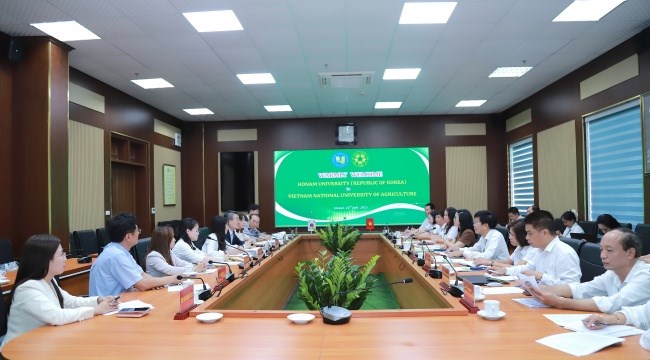
Overview of the working session
Attending the session, on VNUA's side, there were Prof. Dr. Nguyen Thi Lan, VNUA’s President; MA. Le Thi Bich Lien, Vice Head of the International Cooperation Office; Dr. Nguyen Thanh Hai, Head of the Academic Affairs Office; Assoc. Prof. Dr. Lai Thi Lan Hương, Head of the Personnel Organization Office; Dr. Nguyen Tat Thang, Dean of the Faculty of Tourism and Foreign Languages; Assoc.Prof.Dr. Ho Ngoc Ninh, Vice Dean of the Faculty of Tourism and Foreign Languages; MA. Tran Thi Ha Nghia, Vice Dean of the Faculty of Tourism and Foreign Languages; Dr. Tran Le Thanh, Dean of the Faculty of Social Sciences; Dr. Nguyen Thi Hien, Vice Dean of the Faculty of Mechanical and Electrical Engineering; Assoc.Prof.Dr. Do Quang Giam, Dean of the Faculty of Accounting and Business Management; along with specialists from the International Cooperation Office and Faculty of Tourism and Foreign Languages.
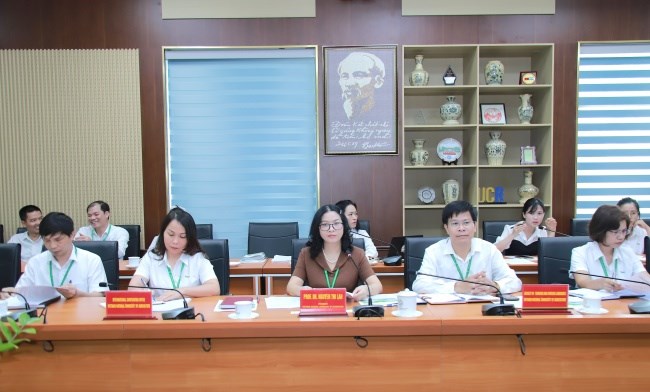
Prof. Dr. Nguyễn Thị Lan, VNUA’s President, chairs the working session.
The Honam University delegation was led by Dr. Park Sang Cheol, President, accompanied by Dr. Lee Sung Oh, Head of the Planning Office; Dr. Son Wan Yi, Head of the International Cooperation Office; Mr. Jeong Seong Ik, President’s Office Officer; Prof. Dr. Quan Wen Hua, International Cooperation Coordinator; Ms. Nguyen Thi Bich Thuy; Ms. Nguyen Thi Le Hoa, Assistant of the International Cooperation Office; and Dr. Shim Dong Ho, expert.
In her remarks, Prof. Dr. Nguyen Thi Lan, VNUA’s President, expressed her pleasure in welcoming the delegation from Honam University. She emphasized VNUA’s strong efforts in implementing the strategy of educational internationalization and introduced an overview of the training programs, scientific and technological activities, and key international cooperation projects that VNUA had been carrying out with partners worldwide.
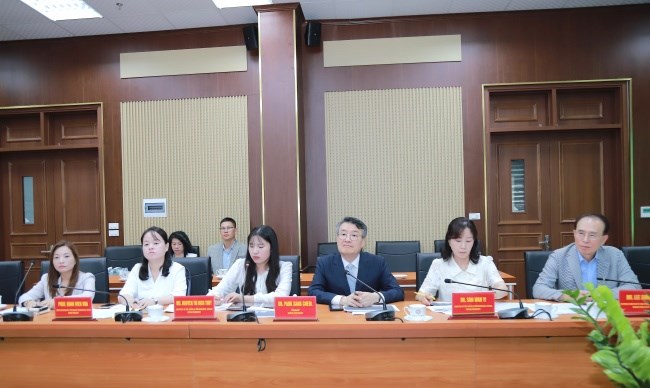
Dr. Park Sang Cheol, President of Honam University, and accompanying staff
During the meeting, both universities discussed and proposed many potential cooperation activities to promote international education linkages, cultural exchange, and science and technology transfer, including:
- Organizing student and faculty exchange programs between the two universities;
- Developing strong joint undergraduate programs;
- Cooperating Master’s and Doctoral training at Honam University (HNU).
- Implementation of short-term student exchange programs (3 months, 6 months, 1 year).
- Supporting VNUA students in accessing Korean scholarship funds;
- Collaborating to establish the Faculty of Korean Studies and Sejong Korean Language Center at VNUA.
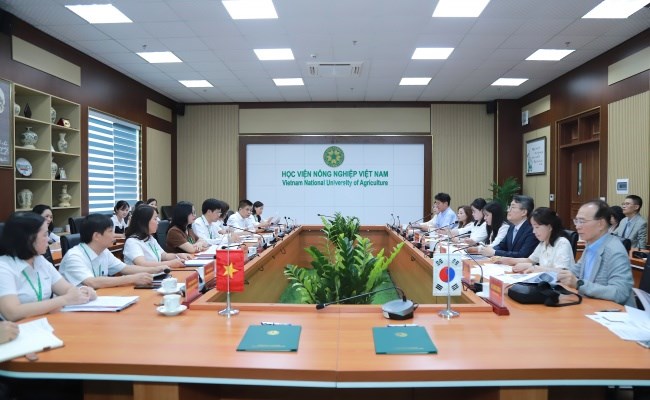
Honam University expressed strong agreement with the proposed areas of cooperation and committed to working closely with VNUA to effectively implement these initiatives. Practical support from Honam University includes tuition incentives for students participating in undergraduate and graduate transfer programs at HNU, co-building the Sejong Korean Language Center, and launching short-term exchange programs for both students and lecturers.
At the end of the working session, the two universities signed a Memorandum of Understanding on cooperation, affirming their commitment to jointly develop a sustainable and effective partnership.
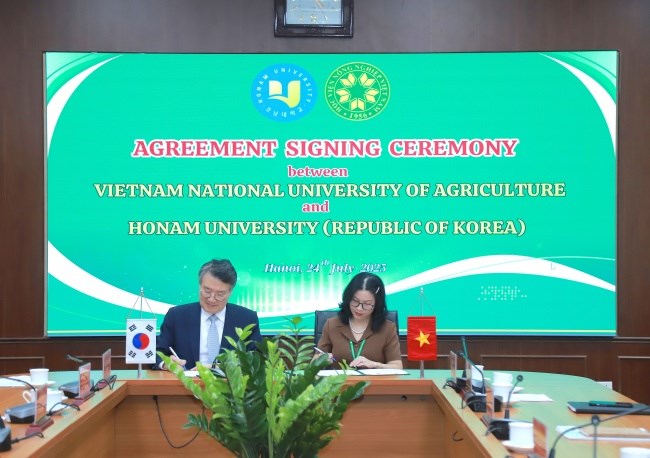
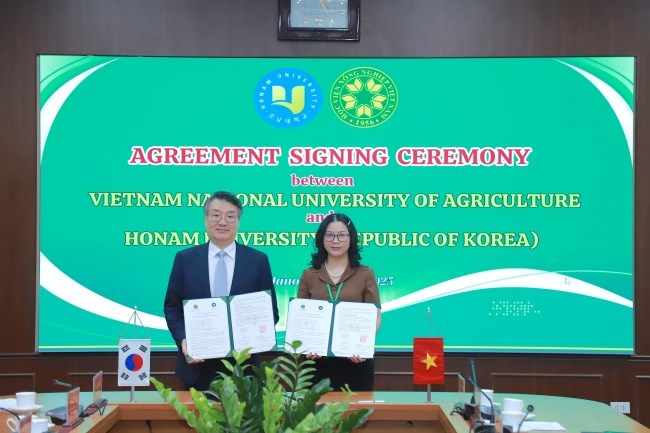
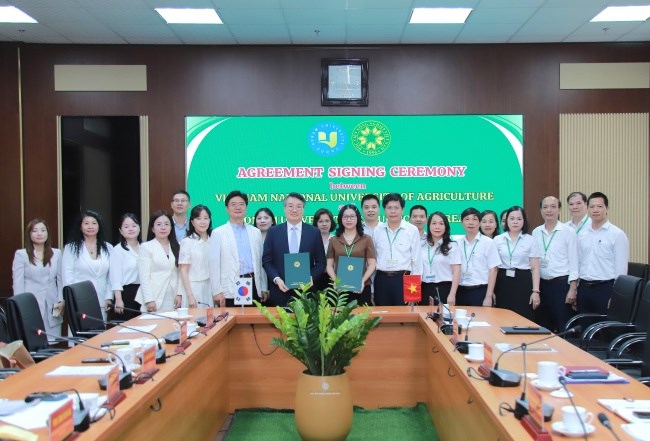
VNUA and Honam University sign the Memorandum of Understanding
This event not only expanded VNUA's international cooperation network but also affirmed its increasingly solid position on the regional and international educational map. Furthermore, the partnership between the two universities would provide opportunities for students and faculty to enhance their expertise, professional skills, and qualifications in line with the current trend of global educational integration. In the near future, concrete collaborative programs between the two universities would continue to be promoted with a practical and effective spirit, for the long-term benefit of students and lecturers of both universities.